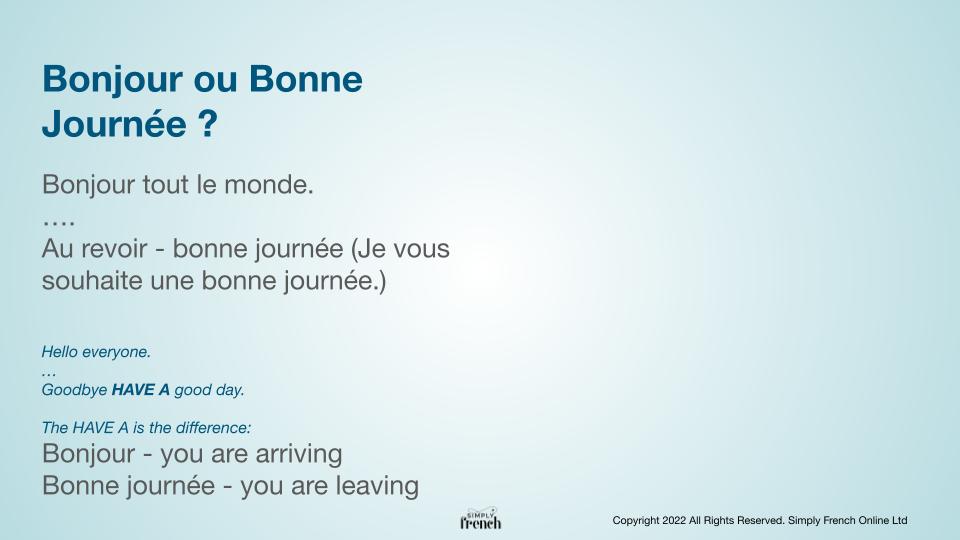Bonjour or bonne journée? Which one is it?
Mar 14, 2023Do you mess up your Bonjour and your Bonne journée? ... Just how DO you greet your guest in the morning?
If you want to carry on your conversation in French, it’s helpful to know if you’re greeting someone or if you’re basically sending them on their way.
It’s ok: it’s a subtle difference in French, and once you know what’s going on, you get it!
This is what you will be focusing on in this mini-lesson:
- The difference between Bonjour & Bonne journée
- Ways to remember which is which
- The best greetings for your guest in the morning

What’s the difference between “Bonjour” and “bonne journée”?
This is a mistake many students make. And it’s normal. The words / expressions look very similar. However, the difference regarding the meaning is enormous.
Let’s clarify things once and for all.
“Bonjour” is always when you are arriving and “Bonne journée” is what you say when you're leaving.
To help you memorise, you could associate the “one” word with the arrival and the “two-word” expression with the departure.
By the way, you could also say “coucou” when you are arriving but only with your friends and when your aim is to attract the attention of someone or when you appear as a surprise!
Coucou is also good for a text message opener.
And, if you wish to be more general while leaving, suffice to say “au revoir” meaning good bye. There’s another more familiar version: “ciao”.

How do you greet your guest(s) in the morning?
Let’s imagine now that you have a guest at home and they spent the night at your place.
The first question you would naturally employ is:
- Bonjour. Ça va ? Tu as bien dormi ? >>> Good morning. How are you? Did you sleep well?
If you have more than one guest, you would say:
- Bonjour. Ça va ? Vous avez bien dormi ? >>> Good morning. How are you? Did you sleep well?
In the next section, you see expressions in other situations with your guests.
How to use the adverb “bien” with your family, friends, and guests.
You have just seen how to greet in the morning.
One thing you wish for your family, friends, and guests is a great experience and the correct word is “bien”, which means well.
Since you are asking about their experience, the passé composé is required. The trick here is to know where to put the adverb “bien” at the perfect place within the sentence.
The answer is to colocate it between the auxiliary and the past participle. Let’s play with various examples:
- Tu as bien aimé le lit ? / Vous avez bien aimé le lit ?> >> Did you like the bed (well)?
- Tu as bien mangé ? / Vous avez bien mangé ? >>> Did you eat well?
- Tu as bien bu ? / Vous avez bien bu ? >>> Did you drink well?

The elision tip to sound like native French speakers.
Whether you want to sound like a native French or not, at least you should be prepared to understand when people “eat words”.
When natives talk, they would tend to squish words. It’s what we call the elision.
Indeed, instead of saying “tu as”, they would rather use “t’as”!
Let’s see the same examples but now in a more natural way:
- T’as bien aimé le lit ? >>> Did you like the bed (well)?
- T’as bien mangé ? >>> Did you eat well?
- T’as bien bu ? >>> Did you drink well/enough?
And the following verb becomes the most important part of your sentence. That is why you will stress it.

Use this common French expression:
There’s a fun expression you must know and repeat as much as possible.
Besides, It’s a great way to start up a conversation:
- Quoi de neuf ? >>> What’s new?

What do you say in French when you are leaving?
Time to focus on what to say when you are leaving.
First, let’s see the general ones:
- Bonne journée >>> Have a nice day
- Bon après-midi >>> Have a nice afternoon
- Bonne soirée >>> Have a nice evening
Usually, you would say the first one before noon. The second one would be after noon and the last one would be around 6 or 7 pm. There’s no clear line between the end of the afternoon and the beginning of the evening. You could refer to darkness maybe…
Have you noticed the difference between “bon” and “bonne”? For the masculine, you need the nasal one: “bon”. On the contrary, “bonne” goes with feminine words.
Now, let’s be more specific with the same expressions:
- Bonne fin de journée >>> Enjoy the rest of the day
- Bonne fin d’après-midi >>> Enjoy the rest of the afternoon
- Bonne fin de soirée >>> Enjoy the rest of the evening

I truly hope that you can now easily distinguish all these expressions. Can you identify the ones when you are arriving? The ones when you are leaving?
Can you play with “bon” and “bonne”? Do you feel ready to greet your guests?
Should you have any additional questions, I'm here to help. And if you ever come to visit me for an Immersive homestay, you will certainly hear me greeting you in the morning in French...
Free Masterclass
Learn my 4 step method of how to hold meaningful french conversations the R.E.A.L. way in just 30 minutes a day.
When you signup, we'll be sending you weekly emails with additional free content

